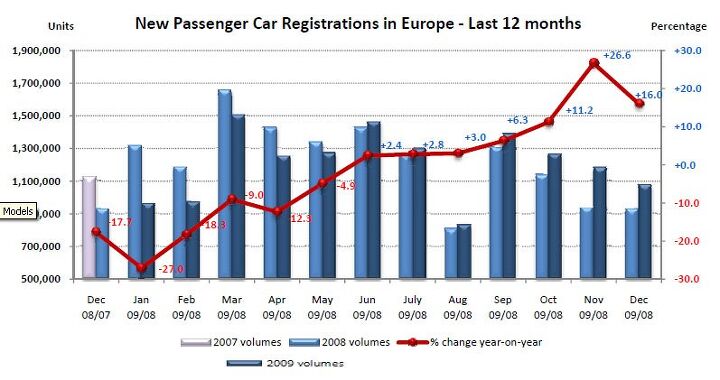Europe In 2009: Avoided The Worst, Saved By Germany And France

Europe avoided the worst of carmageddon. While the U.S.A. was down 21.2 percent in 2009 and China was up 45 percent, Europe as a whole ended 2009 with the same sales as in 2008, more or less. According to data released by ACEA, the European Union survived 2009 with a slight drop of 1.6 percent.
Numbers were dragged down by miserable results in most of the new member states, which show a loss of 26 percent. Only three countries in the east show a plus: The Czech Republic with 12.5 percent, Slovakia up 6.7 percent, and Poland skidding by with 0.1 percent growth. Basket cases of the East are the Baltic States: Latvia down a whopping 80.5 percent, Lithuania down 67.4 percent and Estonia down 66.2 percent for 2009.
The “old” member states in the West actually managed a slight plus of 0.9 percent, driven mainly by Abwrackprämien-powered Germany (+23.2 percent) and similarly generous France (+ 12.5 percent.) Western basked cases are Ireland (-62.1 percent,) followed by Finland (-35.2 percent) and Denmark (-25.3 percent.)
European new car registrations had picked up in the second half of last year, largely due to the impact of fleet renewal schemes in a number of major markets. In June 2009, Europe went into plus territory and steadily grew to a peak of +26.5 percent in November. December sales were a bit more subdued, with a growth of 16.6 percent compared to a very weak December of 2008.
If the EU would be counted as a common market, it would count as the world’s largest car market, with 14.3m sold, narrowly beating China (13.6m.) There is a case for that. The EU has (mostly) common borders, (mostly) one currency, and started as a common market after all. This year, it will be a moot point, as China will have bypassed even whole of Europe.
The complete report can be downloaded here as PDF, for the number crunchers, it is also available as Excel spreadsheet. Excel spreadsheet also includes interesting manufacturer data. Refer to TTAC’s roundup of 2009 sales data for a continuously updated roundup of 2009 sales data from around the world.

Bertel Schmitt comes back to journalism after taking a 35 year break in advertising and marketing. He ran and owned advertising agencies in Duesseldorf, Germany, and New York City. Volkswagen A.G. was Bertel's most important corporate account. Schmitt's advertising and marketing career touched many corners of the industry with a special focus on automotive products and services. Since 2004, he lives in Japan and China with his wife <a href="http://www.tomokoandbertel.com"> Tomoko </a>. Bertel Schmitt is a founding board member of the <a href="http://www.offshoresuperseries.com"> Offshore Super Series </a>, an American offshore powerboat racing organization. He is co-owner of the racing team Typhoon.
More by Bertel Schmitt
Latest Car Reviews
Read moreLatest Product Reviews
Read moreRecent Comments
- Calrson Fan Jeff - Agree with what you said. I think currently an EV pick-up could work in a commercial/fleet application. As someone on this site stated, w/current tech. battery vehicles just do not scale well. EBFlex - No one wanted to hate the Cyber Truck more than me but I can't ignore all the new technology and innovative thinking that went into it. There is a lot I like about it. GM, Ford & Ram should incorporate some it's design cues into their ICE trucks.
- Michael S6 Very confusing if the move is permanent or temporary.
- Jrhurren Worked in Detroit 18 years, live 20 minutes away. Ren Cen is a gem, but a very terrible design inside. I’m surprised GM stuck it out as long as they did there.
- Carson D I thought that this was going to be a comparison of BFGoodrich's different truck tires.
- Tassos Jong-iL North Korea is saving pokemon cards and amibos to buy GM in 10 years, we hope.


































Comments
Join the conversation
European countries might not be socialist by the old standards (as in soviets, Cuba, Hugo C etc etc), but living in the Netherlands, one could make a case for most of the northern european welfare state countries as socialist in the original meaning of the word. Here in the Netherlands, the difference in living standards between making 70K (euro) or 35K is much much smaller than in the US due to income taxes, taxes on luxury goods like cars, elligibility for all kinds of subsidies for people who make less money etc etc. Also, private health care is basically tied down so bad it's non-existent, meaning you have to go through the public health care system, meaning if you do something mundane like break a leg you're good, but if you have some kind of individiual rare disease you're screwed. Since you are not directly paying your doctor's fees all your purchasing power you should have is voided. Also, government parties we'd call 'right-wing' usually have ideas comparable to US democrats, so even if governments aren't left in name, they usually are in ideas. Obviously all of this works out fine for some people and not so good for others. I would love it to become a little more social and less socialistic though.
So, if I read the spreadsheet correctly Germany sold 3.8 million cars and not 3.09 million as stated in the round up. Damn, that places Brazil below Germany (barring South Korea) as the 5th largest market. Ah well. But Mr. Scmitt, what do you think Germany's numbers will look like in 2010 (without a scrappage plan)? Here in Brazil, according to who you talk to, forecasts are of an increase of 4% to 10% in 2010 over 2009. Though we all know just how "good" these prognoses are, I was wondering, could Brazil finally pass Germany in 2010?